I saw "The Aviator", the story of Howard Huges the Billionaire who had a dream to make big movies and make great planes. A man who inspite of all the roadblocks placed in front of him went on to achieve his dreams. The movie winning oscars proved its technical brilliance. While seeing the movie I was reminded of another great an inventor, a visionary, a rebel and a hero who failed to realize his dream, a dream to build a "car of the future", or did he ! Read on and then make your verdict! Did he fail or in his failure there was a victory! This is the story of an American Car maker Preston Tucker who gave what the Americans wanted "the car of tomorrow today!". A near accurate movie had been made on Tucker's life "Tucker The Man and His Dream" by Francis Ford Coppola.
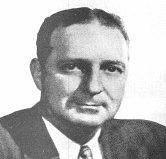 Preston Thomas Tucker born on September 21 1903 in Capac, Michigan, Tucker was the designer of the innovative Tucker '48. His vision was to create the "car of the future," sporting features such as safety glass, seat belts, a third headlight which turned as the driver turned the steering wheel, and an engine in the rear of the vehicle. Tucker spent his childhood around mechanics' garages and used car lots. He worked as an office boy at Cadillac, a policeman in Lincoln Park, and even worked for a time at Ford Motor Company. After attending Cass Technical School in Detroit, Tucker turned to salesmanship, first for Studebaker, then Stutz, Chrysler, and finally as regional manager for Pierce-Arrow.
Preston Thomas Tucker born on September 21 1903 in Capac, Michigan, Tucker was the designer of the innovative Tucker '48. His vision was to create the "car of the future," sporting features such as safety glass, seat belts, a third headlight which turned as the driver turned the steering wheel, and an engine in the rear of the vehicle. Tucker spent his childhood around mechanics' garages and used car lots. He worked as an office boy at Cadillac, a policeman in Lincoln Park, and even worked for a time at Ford Motor Company. After attending Cass Technical School in Detroit, Tucker turned to salesmanship, first for Studebaker, then Stutz, Chrysler, and finally as regional manager for Pierce-Arrow.
During World War II, all production efforts were for the army. None of the companies built any new models. Tucker built a light armour vehicle for the army. The army rejected the bullet proof vehicle on the basis that it was too fast. But his innovative ideas were appreciated by everybody. It was post-war when the market was more open, people were willing to buy and wanting something new, that Tucker felt that it was the right time to realise his dream, a dream that would also be loved by the American public. He formed the Tucker Corporation in 1946 to manufacture his dream car. Unlike Howard Hughes who had a lot of money of his own, Tucker did not have any. To realise his dream he needed money. He wanted to buy a plant, where he could build his cars. He set his eyes on an old Dodge plant in chicago which used to build engines for the B-29 during WWII. The War Assets Administration leased the plant to Tucker provided he could raise $15 million by March 1, following year. It was a herculean task for the cash-stripped Tucker Corporation. But Tucker was a salesman at heart and he believed that he could sell his dream to the American public and thus raise the capital. He hired a famous car designer Alex Tremulis, an award winning car designer, to design the Tucker Torpedo and he himself set out to raise the capital.
Tucker devised an innovative scheme to raise the capital. He went on a marketing blitzkerg across the country, showing posters, telling people what his car was going to be. He talked about the advanced features about the car, the innovative design, the rear engines and the revolutionary safety features. Having a very charismatic Persona, Tucker won hearts and minds whereever he went. He was soon able to sell dealer franchises and raise a capital of $6 million. All this without even having a prototype of the car. This attracted the attention of the Big Three car makers, Ford , Chrysler and GM who felt threatened by the new innovations that Tucker promised. Tucker's manner of raising capital also attracted the attention for the Securities Exchange Commission (SEC), a federal government agency. The SEC set up an investigation into the sale of franchises made by Tucker. As the work on Tucker Torpedo was about to begin, Tucker faced another obstacle. Wilson Wyatt, head of the National Housing Agency, ordered the WAA to cancel Tucker's lease and turn the plant over to the Lustron Corporation to build pre-fab houses. Tucker was caught up between a bureaucratic struggle between the WAA and the National Housing Agency. Meanwhile troubles with the prototype were brewing up. The company did not have adequate money to afford clay to build the prototypes. So they built the prototypes by beating steal, something which was totally unheard off.
The SEC later caused costly delays in approving the initial Tucker stock offering. By selling stock in Tucker Corporation to the public, Tucker was inviting them to join his enterprise, to become part-owners and accept the risk of ownership--by sharing the profits of success, or the losses of failure. Funds raised from dealership and stock sales provided the money to design and build the first Tucker'48s. But the SEC never stopped its harassment of Preston Tucker. The established auto industry didn't want new competition, and their "Senator from Detroit," Homer Ferguson, led the battle to crush Tucker Corporation. Further energizing the investigation of Tucker was SEC Commissioner Harry McDonald, also from Detroit. Regional SEC Chief Thomas B. Han apparently hated Tucker, and was relentless in his efforts to bring him down. The SEC may have spent more money investigating the Tucker Corporation than the Tucker Corporation spent designing and building the "car of the future."
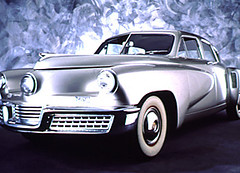 The Tucker '48 (Tucker Torpedo renamed) premiered June 19, 1947 in the Tucker plant before the press, dealers, distributors and brokers. The prototype was so hastily build, that it was plagued with problems. It failed to start and there was a small fire. All this happened behind the curtains while Tucker was speaking to the public. When Tucker came to know about this, he went on speaking and also called upon other eminent personalities to speak. At the same time he told his associates that the premire of Tucker '48 would not be put off. They worked hastily to make the car ready for display. Though many features in the Tucker '48 shown to public were stripped down from the original specifications, it still stole the hearts of the public. It was very close to what the public expected and wanted. It was now time to go into mass production.
The Tucker '48 (Tucker Torpedo renamed) premiered June 19, 1947 in the Tucker plant before the press, dealers, distributors and brokers. The prototype was so hastily build, that it was plagued with problems. It failed to start and there was a small fire. All this happened behind the curtains while Tucker was speaking to the public. When Tucker came to know about this, he went on speaking and also called upon other eminent personalities to speak. At the same time he told his associates that the premire of Tucker '48 would not be put off. They worked hastily to make the car ready for display. Though many features in the Tucker '48 shown to public were stripped down from the original specifications, it still stole the hearts of the public. It was very close to what the public expected and wanted. It was now time to go into mass production.
But that required money, something which Tucker still did not have. By 1948, Tucker had a pilot production line set up but his stock issue had been $5 million short and he again needed immediate money. He began a pre-purchase plan for Tucker automobile accessories such as radios and seat covers. Although he raised $2 million, advanced payment on accessories to a car not yet in production was the final straw for the SEC. On May 28, 1948, the SEC and the Justice Department launched a full-scale investigation. Investigators swarmed the plant and Tucker was forced to stop production and lay-off 1600 workers. Receivership and bankruptcy suits piled up, creditors bolted and stock plunged. The SEC's case had to show that the Tucker car could not be built, or if built, would not perform as advertised. But Tucker was building cars. Seven Tuckers performed beautifully at speed trials in Indianapolis that November, consistently making 90 mph lap speed. However after Thanksgiving, a skeletal crew of workers assembled the remaining 50 cars the company would ever produce. In January 1949, the plant closed and the company was put under trusteeship.
On June 10, Tucker and seven of his associates faced a Grand Jury indictment on 31 counts - 25 for mail fraud, 5 for SEC regulation violation, and one on conspiracy to defraud. The trial opened on October 5, 1949 and from the beginning the prosecution based its entire case on the "Tin Goose" prototype. It refused to recognize the 50 production cars and called witness after witness who, under cross-examination, ended up hurting the government's case. In the end, Tucker's defense team merely stated that the government had failed to prove any offense so there was nothing to defend.
On January 22, the jury found the defendants innocent of any attempt to defraud, but the verdict was a small triumph. The company was already lost. The remaining assets and the Tucker automobiles were sold at a piecemeal rate.
Incredebily in 1951, Tucker started again. he went to Brazil to seek backing for another new car. With the new project almost underway, he was diagnosed with lung cancer. He died December 26, 1956.
Out of the 51 Tucker's ever producecd incredibly, 47 of them are still in working condition. They are spread across the US in different Car museums and some are under personal ownership. Many of the innovative features of the Tucker '48 later went on to become industry standards. In the endevours of Tucker there is a very strong message for all of us. An Idea is the seed of anything revolutionary, a dream is a precursor to an achievement. It is not always that in pursuance of a dream, things will be easy or that every innovator will always win. But what is important is the willingness to pursue the dream without being bogged down by the roadblocks and without being bothered about the result.
Until next week
Cherio


 Preston Thomas Tucker born on September 21 1903 in Capac, Michigan, Tucker was the designer of the innovative Tucker '48. His vision was to create the "car of the future," sporting features such as safety glass, seat belts, a third headlight which turned as the driver turned the steering wheel, and an engine in the rear of the vehicle. Tucker spent his childhood around mechanics' garages and used car lots. He worked as an office boy at Cadillac, a policeman in Lincoln Park, and even worked for a time at Ford Motor Company. After attending Cass Technical School in Detroit, Tucker turned to salesmanship, first for Studebaker, then Stutz, Chrysler, and finally as regional manager for Pierce-Arrow.
Preston Thomas Tucker born on September 21 1903 in Capac, Michigan, Tucker was the designer of the innovative Tucker '48. His vision was to create the "car of the future," sporting features such as safety glass, seat belts, a third headlight which turned as the driver turned the steering wheel, and an engine in the rear of the vehicle. Tucker spent his childhood around mechanics' garages and used car lots. He worked as an office boy at Cadillac, a policeman in Lincoln Park, and even worked for a time at Ford Motor Company. After attending Cass Technical School in Detroit, Tucker turned to salesmanship, first for Studebaker, then Stutz, Chrysler, and finally as regional manager for Pierce-Arrow.
 The Tucker '48 (Tucker Torpedo renamed) premiered June 19, 1947 in the Tucker plant before the press, dealers, distributors and brokers. The prototype was so hastily build, that it was plagued with problems. It failed to start and there was a small fire. All this happened behind the curtains while Tucker was speaking to the public. When Tucker came to know about this, he went on speaking and also called upon other eminent personalities to speak. At the same time he told his associates that the premire of Tucker '48 would not be put off. They worked hastily to make the car ready for display. Though many features in the Tucker '48 shown to public were stripped down from the original specifications, it still stole the hearts of the public. It was very close to what the public expected and wanted. It was now time to go into mass production.
The Tucker '48 (Tucker Torpedo renamed) premiered June 19, 1947 in the Tucker plant before the press, dealers, distributors and brokers. The prototype was so hastily build, that it was plagued with problems. It failed to start and there was a small fire. All this happened behind the curtains while Tucker was speaking to the public. When Tucker came to know about this, he went on speaking and also called upon other eminent personalities to speak. At the same time he told his associates that the premire of Tucker '48 would not be put off. They worked hastily to make the car ready for display. Though many features in the Tucker '48 shown to public were stripped down from the original specifications, it still stole the hearts of the public. It was very close to what the public expected and wanted. It was now time to go into mass production.
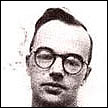 Emil Julius Klaus Fuchs, born on December 29, 1911 in Germany, was an enigma. Son of a Lutheran priest, was brilliant in his studies right from childhood. He joined the German Socialist Party in his college days. In 1933 when Hitler's Nazi party came to power, Fuchs felt threatened and escaped to Paris. Sometime later he moved to Britain where he completed his Doctorate from the University of Bristol. He had developed into a brilliant physicist, but when Germany invaded France, all Germans in England were interned and sent to various prison camps. Fuchs was sent to Quebec Canada. Fuchs was able to survive this internship by reading the scientific papers of Heisenberg, Einstein and Bohr and smoking incesstantly on the cigarettes provided by his canadian captors. As suddenly as he was captured in 1940, his release was equally sudden in 1942. He was sent back to England where he was recruited by the University of Birmingham to carry out Atomic research.
Emil Julius Klaus Fuchs, born on December 29, 1911 in Germany, was an enigma. Son of a Lutheran priest, was brilliant in his studies right from childhood. He joined the German Socialist Party in his college days. In 1933 when Hitler's Nazi party came to power, Fuchs felt threatened and escaped to Paris. Sometime later he moved to Britain where he completed his Doctorate from the University of Bristol. He had developed into a brilliant physicist, but when Germany invaded France, all Germans in England were interned and sent to various prison camps. Fuchs was sent to Quebec Canada. Fuchs was able to survive this internship by reading the scientific papers of Heisenberg, Einstein and Bohr and smoking incesstantly on the cigarettes provided by his canadian captors. As suddenly as he was captured in 1940, his release was equally sudden in 1942. He was sent back to England where he was recruited by the University of Birmingham to carry out Atomic research.
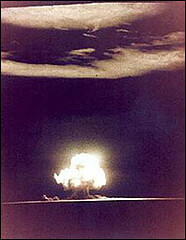 There was a gap in their meetings as Fuchs and other scientists shifted to Los Alamos where the real work was going on. They were working on two types of bombs. The "Little Boy" which used Uranium - 235 , was dropped on Hiroshima and "Fat Man" which used Plutonium, was dropped on Nagasaki. A third bomb known as the "Gadget" was to be used for testing. It was here that Edward Teller proposed the idea of the Hydrogen Bomb referred as "The Super" at that time. Klaus thought the idea of "The Super" to be remote and far fetched. After the successful test of the Gadget, Scientists were slowly sent back. Klaus was also in the process of winding up his work and looking forward to go back to England. But before he went back, he had one very important job to finish. He had to meet Raymond!
There was a gap in their meetings as Fuchs and other scientists shifted to Los Alamos where the real work was going on. They were working on two types of bombs. The "Little Boy" which used Uranium - 235 , was dropped on Hiroshima and "Fat Man" which used Plutonium, was dropped on Nagasaki. A third bomb known as the "Gadget" was to be used for testing. It was here that Edward Teller proposed the idea of the Hydrogen Bomb referred as "The Super" at that time. Klaus thought the idea of "The Super" to be remote and far fetched. After the successful test of the Gadget, Scientists were slowly sent back. Klaus was also in the process of winding up his work and looking forward to go back to England. But before he went back, he had one very important job to finish. He had to meet Raymond!
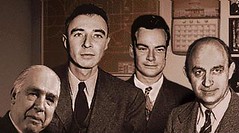 The biggest irony of Manhattan Project is that some of the greatest physicts of our era be it Eienstien, Feynmaan, Niels Bhor etc. were all involved in creating of a weapon which led to the most horrific and destructive action - The bombings of Hiroshima and Nagasaki!
The biggest irony of Manhattan Project is that some of the greatest physicts of our era be it Eienstien, Feynmaan, Niels Bhor etc. were all involved in creating of a weapon which led to the most horrific and destructive action - The bombings of Hiroshima and Nagasaki!
